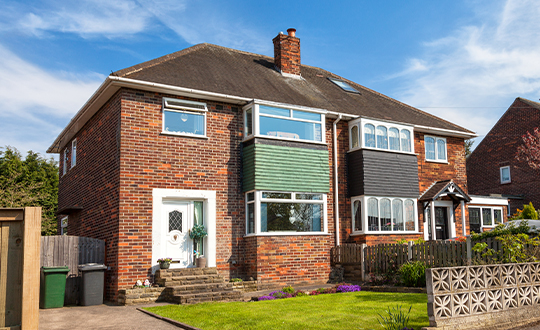How Much Do I Need to Earn to Get a Mortgage of £250,000?

Before you start applying for a mortgage, it is a good idea to find out how much you may be able to borrow. There is no point going through the long mortgage application process to then discover that you will not get the amount that you need to be able to buy the house that you are interested in.
Therefore, the first step to take before applying for a mortgage is to get an idea of how much a lender will be prepared to lend you, so you can start your house search within the right price range.
Typically, you can borrow 4 x your salary and this was traditionally the main measure of how much banks would lend to mortgage applicants. So based on this calculation, you would need to earn £62,000 per year to get a mortgage of £250,000.
However, the mortgage industry has had stricter regulations introduced to ensure lenders are not agreeing to lend more money than people can afford to pay for their mortgage, so the lender will review more than your salary.
Different lenders also apply different sets of criteria, so there is no set calculation that will tell you how much you can borrow but you can get a very close estimate through online calculators for each lender.
Watch this video we produced for a detailed and comprehensive explanation:
How much do I need to be earning to afford a £250k mortgage?
The average house price in the UK was £250,000 in February 2021 according to the Office for National Statistics, so we will look in more detail at how much you would need to be earning to be able to afford the average house price of £250,000.
What impacts your eligibility for a mortgage?
As we mentioned above, it is no longer a case of just taking your salary and multiplying by four to reach the amount that you can borrow. The other factors that are used to calculate how much you are able to borrow are:
Loan-to-income ratio
The lender will look at the ratio between your income and the loan. For example, some lenders will make sure that the loan-to-income ratio is less than 28%. Some lenders will look at your overall debt-to-income ratio, to ensure that your mortgage plus all other monthly financial commitments is under a certain ratio amount, such as 36%.
As well as looking at how much your income is, the lender will also look at the consistency of your income, so they will look at your average income over a certain period. If your income is quite variable, the lender is likely to see this as more of a risk than if you have a steady, regular income each month.
For lenders who work on the 28% ratio basis, the combined income of the mortgage applicants would need to be at least £70,000. For lenders who work on a 4.5 x salary basis, the combined income of applicants would need to be at least £55,000.
Mortgage affordability can really vary from one lender to another, so even if one lender will not provide the loan amount you are looking for, you may still find another that will.
Free phone and video consultations are provided in the U.K.
Get StartedLoan-to-value ratio
Another key factor that the lender will assess is the percentage of the loan to the value of the property. If you have a larger amount of deposit, the lender is more likely to be prepared to lend you a higher amount than if you had a smaller deposit, which is why many people try to save up a high deposit sum before buying a house.
The loan-to-value (LTV) is often used to not only identify how much the lender will loan to you but also the interest rate they offer will often depend on this.
The larger the deposit you have for your property purchase, the better your LTV will be and the more preferential interest rates you should be able to obtain. If your house value is £250,000 and your mortgage loan is £200,000 your LTV would be 80% because £200,000 is 80% of £250,000.
A lot of lenders will want at least a 10% deposit, which would be a 90% LTV. However, having a higher deposit than 20% is usually required to access the best mortgage deals in terms of lower interest rates.
Affordability
When deciding how much they are prepared to lend to an applicant, the lender will also calculate their affordability. As well as looking at your income and how consistent it is, the lender will want to review your monthly outgoings and amount of debt that you have in total.
The lender will look at every type of cost that you have, including your supermarket bills, car loans, any other debt you are repaying and even costs such as going out for meals, drinks and buying clothes. They will also look at travel expenses. This means that if you run a car, your fuel costs as well as insurance and any car loan repayments will be accounted for. If you commute to work on the train, they will include how much you are spending on train tickets in their calculations.
The lender will want to make sure that once you have paid for all of your essential outgoings, as well as how much you are likely to spend on socialising, that you would still be able to afford your mortgage repayments.
It may help to modify your expenditure in the months leading up to your mortgage application to show that you are able to keep your outgoings down. You need to be able to show that you have enough surplus money each month to be able to pay the mortgage repayments.
See What Our Clients Have To Say
Credit history
Your credit history will also be checked to ensure that you are reliable at repaying loans and other debt that you have had. If you have never taken out any type of credit, this can be detrimental to a mortgage application, as the lender has no evidence that you are capable of repaying your debts.
Before you apply for a mortgage, it is a good idea to check your credit score, which you can do through several different providers, such as Experian, where you can do a free trial to see your credit report. Your credit rating is usually provided out of 99%, and the higher your rating percentage is, the more chance you will have of getting the mortgage loan that you are looking for.
If you have a poor credit history, through missing payments for example, then you should try and ensure that your credit score improves in the months leading up to your application. Making sure that you make all the payments on time and reducing the outstanding amount on your credit card or store cards will also improve your credit score.
Source of income
When lenders are reviewing mortgage applications, they are looking for the lowest risk forms of income. Ideally, they want to lend to people that are on a very steady income and have been in their job for a long time, with a minimal chance of losing their job, through being made redundant. Their perfect applicant has high job security and a consistent salary that is likely to increase each year.
If you have changed jobs on a regular basis or had periods of unemployment, then you would be deemed as higher risk than someone who has been in the same job for ten years. Self-employed people often struggle to obtain mortgages because it is more difficult to evidence their income, as they do not have a guaranteed salary each month and their income can vary month to month. Lenders will ask for their bank statements and business accounts to review their average income.
Age
Most mainstream lenders have an age limit of 70 years old for their mortgage terms. There are only a minority of lenders at this time that allow their mortgage terms to exceed this age. Lenders will be wary of lending to people who will be close to entering retirement age in the duration of the mortgage. If you are in your 50s, for example, taking out a 25-year mortgage is unlikely to be approved, as most people will have retired before the end of the term of the mortgage.
For younger applicants aged 20-30, a 25 or even 30-year mortgage is realistic but it is important to remember that the longer you take out the mortgage over, the more interest you will be paying.
How much will a £250,000 mortgage cost?
If you get a mortgage for £250,000 the cost can vary depending on the type of mortgage you take out. If you have a fixed rate mortgage, you will be paying the same amount each month, no matter what happens. However, if you take out a variable rate mortgage, your monthly payments can fluctuate.
With fixed rate mortgages, you agree an initial interest rate usually for a period of between 2 and 5 years and then after this, you would revert to a higher rate unless you then arrange a new mortgage with a lower interest rate.
As well as being able to get a mortgage with a good interest rate, the length of mortgage term will also have a huge impact on how much you will be paying each month. People often choose to take a mortgage over a longer period to make it more affordable, as the loan is spread out over a longer time.
If you want to quickly clear your mortgage without making overpayments, you would need to take out a shorter mortgage term. The difference in the overall costs between a 25 and 30-year mortgage would be significant, so you have to weigh up whether you would rather pay less each month or pay less interest over the term.
For example, if you have a mortgage of £250,000, on a 2% interest rate you would pay £1,060 per month over 25 years but if you were to have the same interest rate over 15 years, it would be a monthly payment of £1,609.
If you were on a mortgage deal where the interest rate was 2.5% or 3%, you would be paying considerably more over the agreed term. On a 3% interest rate over 15 years your monthly payment would be £1,726, while over 25 years on 3% it would be £1,185, so as you can see, the length of term has a significant impact on your monthly payment amount.
To get a better idea of how much you would be able to borrow from a lender, you can use the online calculator tool provided by Boon Brokers.
How a broker can help you secure a £250,000 mortgage
If you are looking to find a lender who will provide you with a £250,000 mortgage, the best place to start is by talking to a broker. A broker such as Boon Brokers will be able to source the whole-of-market to identify which lender is most likely to provide you with your required loan amount.
All lenders have different lending criteria. Some might offer a higher mortgage if there are joint applicants even if the income is the same as an individual applicant. Furthermore, if you can access a larger deposit sum, it is likely that you will have access to lower interest rates and higher mortgage sums.
A broker will also be able to calculate which lenders are likely to decline your mortgage application, for example, if you are self-employed, there are many lenders that you could struggle to obtain a mortgage offer from. A broker can find a lender who specialises in self-employed mortgages for this situation.
If you are not able to secure a £250,000 mortgage, a broker should be able to tell you how much you are likely to be able to afford and can help you to find alternative solutions. For example, Government schemes like the Help-to-Buy could be something that would help you to get the property you want by increasing your deposit sum.
Contact the Boon Brokers mortgage team for unbiased advice on your options for taking out a mortgage and to calculate how much you can afford and which lender will be able to provide you with the best mortgage for your needs. Boon Brokers do not charge any client fees at any stage of the advice and arrangement process, which typically saves clients £500 on average in broker fees.
Gerard BoonB.A. (Hons), CeMAP, CeRER
Gerard is a co-founder and partner of Boon Brokers. Having studied many areas of financial services at the University of Leeds, and following completion of his CeMAP and CeRER qualifications, Gerard has acquired a vast knowledge of the mortgage, insurance and equity release industry.Related Articles
- What Is A 100% Mortgage
- What Is A Mortgage In Principle?
- How Much Deposit Do I Need For A Mortgage
- How To Get A Mortgage With A New Job
- What Proof Of Income Is Needed For A Mortgage?
- Benefits Of A Commercial Mortgage
- What Is A Key Facts Illustration?
- Choosing A Mortgage Broker
- What Is A Deed Of Covenant?
- What Are Solicitor Searches?
- Fixed Rate Mortgage
- How To Buy A House After Lockdown













